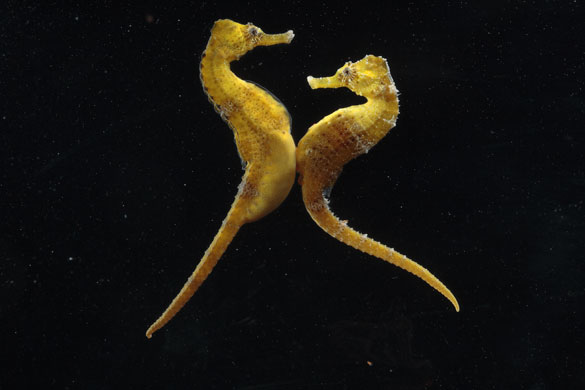(a perfect title :) Poseidon's Steed
Keeping seahorses as pets
Keeping fish is an inherently melancholic pursuit. There are no long walks to be had, no playing with balls of wool or soft fur to stroke. Tank inhabitants can put on a splendid display, but the pet-owner relationship is strictly one-way: owner to fish.
Keeping seahorses, though, seems to be a little different. These are pets you can get to know, and that will get to know you. Seahorse owners are convinced that each has its own personality. Some are show-offs, some are shy, some are affectionate, some put on airs and graces, politely waiting at meal times for their tank mates to join them rather than eating alone. Some are smart, some are lazy, some are head-butting bullies, and some are cheeky, snicking playfully at each other. Many seahorses are trusting, hooking on to their keepers' fingers while their tanks are cleaned; some are clingy, refusing food from anyone but their owners.
Such is the appeal of these fishy characters that seahorse-keeping has become a 21st-century craze, with many contemporary collectors matching the devotion of the most ardent Victorian naturalists. Virtual communities of seahorse keepers from around the world meet up online in chatrooms to exchange stories and tips, put baby seahorses up for adoption, show photographs, and ask questions. "Is my male sterile?" "Why won't they mate?" "Am I overfeeding them?" "What do I do with my new arrivals?" Keepers give their pet seahorses names such as Poseidon, Triton, Thrasher, Pacer, Charlotte, Sea Biscuit, Mrs Speckles and Fat Albert; they speak to them, sing to them, and cry when they die. And in return, seahorses take over lives.
Devoted keepers can't bear to be away from their seahorses who, like Goldilocks, must have things "just right": water temperature, light levels, acidity, nutrient levels and, of course, food. Holidays are forgone so keepers can be on hand to feed their pets. Seahorse stomachs are small and don't hold much food, which means they are almost always hungry.
They can also be highly sensitive, and are prone to a host of ailments and diseases. It is important to watch out for any signs of illness: laboured breathing, "coughing" of gills, blocked snouts, limp drooping fins, or itchy skin infections that need scratching on tank walls. A collapsed air bladder leaves seahorses lacking buoyancy and floundering on the tank floor, while males can get air bubbles lodged in their pouches, causing them to bob hopelessly at the water surface like ping-pong balls.
Indeed, seahorse owners will often keep an emergency hospital tank on standby, so that any sick horses can be quickly isolated and bathed in water-soluble drugs.



Comentários